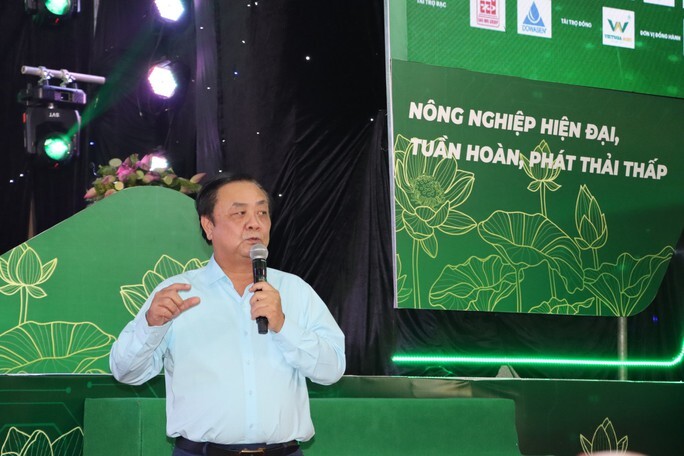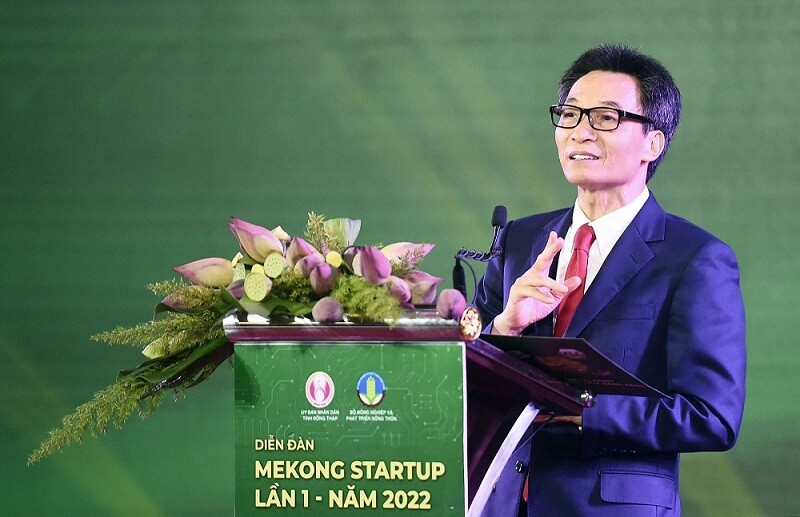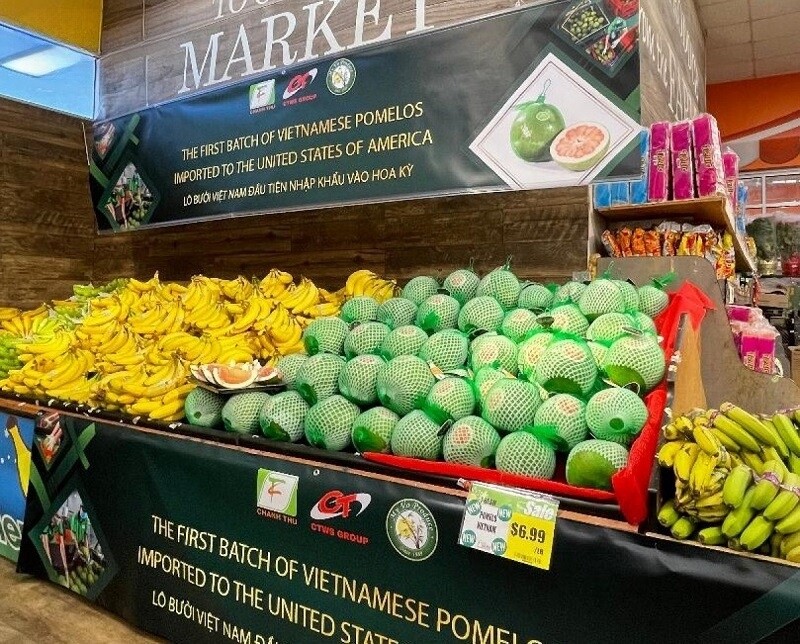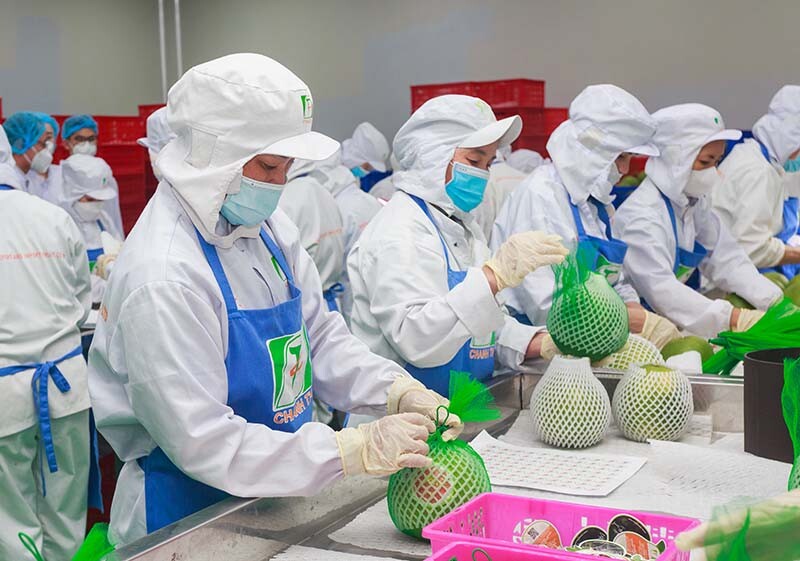This afternoon, December 20, in Dong Thap province, the first plenary session of the Mekong Startup Forum in 2022 with the theme "Modern, circular, low-emission agriculture" was held by the People's Committee of Dong Thap province and the Ministry of Agriculture and Rural Development. Rural Development in collaboration with the organization.
The first Mekong Startup Forum in 2022 is the largest ever-event on agriculture as well as agricultural startups in the province. Attending the forum were leaders of the Government Deputy Prime Minister Vu Duc Dam, Minister of Agriculture and Rural Development - Mr. Le Minh Hoan, Deputy Minister of Agriculture and Rural Development Tran Thanh Nam, ministries and departments. industry, leaders of the Mekong Delta provinces, and gathered more than 500 enterprises.
The first Mekong Startup Forum in 2022 discussed opportunities and challenges around key commodity chains and agriculture in the Mekong Delta. The main goal of the Mekong Startup plenary session in 2022 is to mobilize all resources to develop an innovative and sustainable agriculture industry, ensuring the harmony of natural advantages and creating its imprints.
Mr. Le Minh Hoan - Minister of Agriculture and Rural Development assessed that the forum is a space for leaders, and investors ... to listen, nurture, support individuals, and the startup community, and contribute to development. local agriculture, creating jobs for more people.

Circular agriculture – Sustainable development
Accordingly, the Forum has a great role and mission to raise awareness of all levels, sectors, and businesses in the Mekong Delta on the problem of combating climate change, reducing emissions, greening, and modernizing the agricultural sector…
The Mekong Delta is one of the key economic regions with about 60,000 businesses operating, contributing 50% of rice production, 95% of rice exports, 65% of aquaculture production, and 60% of fish output. exports and nearly 70% of the country's fruit production.
Role of the Ministry, Sector, and Farmers
At the discussion session, Ms. Ngo Tuong Vy CEO Chánh Thu clearly state the role of the Ministries and Sectors in the development of the Agriculture Sector in the Mekong Delta: Firstly, to develop the national Big Data on traceability, second to develop the project of "big fields" "Standardize quality, improve "VietGap" standards to adapt to the standards of key export markets, the third is to invest in a national post-harvest preservation technology research center, the fourth is to invest Linking industry chains: establishing industry associations for each key product (with sanctions, solidarity, and transparency) and finally developing the project "Major fruit brand Made in Vietnam" for the product. specialty fruit products of the Mekong Delta.
Regarding the role of farmers, Ms. Vy shared: "The growing area code is not the role of the Enterprise but the role of the locality, the role of the cooperative and the farmer, this is a basic thing that we want to enter the export market must have. Ms. Vy hopes that the cooperatives participating in the Forum can spread the development of planting area codes and achieve the criteria of export markets as one of the tasks of farmers.
Key fruit brand "Made in Vietnam"
According to Ms. Vy, for Japan, all products are attached with the name "Made in Japan". This makes consumers confident and makes the product more valuable than products in other countries. In other countries, their products are similarly branded.
Therefore, Ms. Vy said that building a fruit brand "Made in Vietnam" is very important, and no business can do it.
To build a "Made in Vietnam" fruit brand, Ms. Vy proposed and selected the main ones, specifically from 3-5 types of fruit to focus on developing, and synchronous solutions from the Central to the Central Government. localities, businesses, cooperatives, and farmers. Later, there will be strategies to develop other fruit products.
In which, the participating parties are all clearly divided into tasks and have set specific goals to strive for completion.
According to Ms. Vy, to build a fruit brand "Made in Vietnam", the next issue is to strengthen consumer confidence.
“For example, my company just exported the first batch of pomelos to the US. Fortunately, consumers love it, especially Vietnamese in the US, who consider pomelos a pride. After the first shipment, many domestic and international customers such as Australia, New Zealand, Canada, etc. came to Chanh Thu Company. It can also be said that exporting fruit to a country that is a difficult market creates great, creates a great deal of confidence in consumers "- Ms. Vy shared. Chánh Thu. Cũng có thể nói, khi xuất khẩu trái cây đến một quốc gia là thị trường khó tính thì tạo niềm tin rất lớn đến người tiêu dùng” – bà Vy chia sẻ.
See more: TProud to be the first batch of Vietnamese pomelos to be exported to the US
4 Main Pillars to Build a Fruit Brand
The general director of Chanh Thu Company said that there are 4 main pillars to building a fruit brand "Made in Vietnam".
The first is to build a a decent agriculture, in which the farmers are kind, the enterprises are kind, and most importantly, the management agency must be kind. From there, make a transparent, responsible story from farming, production, and management.
Secondly, there must be creativity in agriculture to create competition, which is indispensable to stimulating the creativity of businesses. In the production process, businesses need to be provided and updated with market information from the embassies of other countries or other relevant units so that they can keep up with and anticipate consumption trends.
Read more: Chanh Thu meets export standards to the US market
The third is circular agriculture. This is an important key to reducing environmental pressure in each locality as well as improving product value.
Fourth is sustainable agriculture. The government needs to have a stricter agricultural code and a form of sanctions for the directions, strategies, and performance targets of the concerned parties to jointly comply and be responsible.
Source: Dan Viet Newspaper




